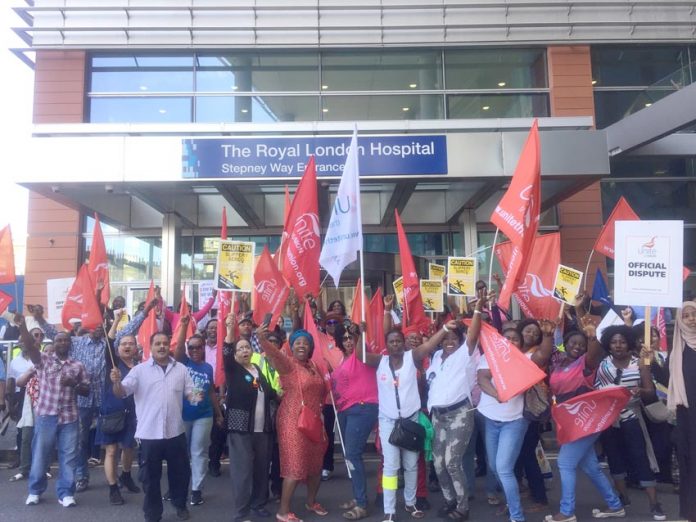
IN THE WAKE of the collapse of Carillion, another outsourcing giant, Serco has taken over 15 healthcare contracts at a bargain basement price in what has been described as a ‘fire sale’ of NHS services.
Carillion went into liquidation in January leaving NHS services in a desperate crisis, as Carillion had contracts to provide cleaners, porters, security and catering staff at many hospitals. The new Royal Liverpool Hospital, which was being built by Carillion is now an abandoned building site.
Serco, which takes on very similar public sector contracts to Carillion, has, however, done very nicely out of Carillion’s collapse. Almost £20m has been knocked off the price of 15 contracts, which were being run by Carillion, but have now been handed over to Serco to run. The contracts are spread across 50 NHS sites.
‘This is a fire sale of NHS services,’ Vaidas, a Serco worker told News Line yesterday. He added: ‘Serco are as bad as Carillion, if not worse. The way that they treat the staff is with no respect at all.
‘Agency staff are being threatened all the time. We had our strike action over Serco’s poverty pay. We were employed by the NHS, since then we were taken over by Serco. Part of the contract was that we were meant to get the London Living Wage and we have never been paid that extra money. Serco could easily collapse, the same way as Carillion. These companies bite off more than they can chew, and it is us the workers who get fired.’
These contracts will now be transferred to Serco for £29.7m, having been worth £47.7m in December when the deal was first signed. As a result of Carillion’s liquidation, Serco said it was forced to re-evaluate ‘potential liabilities, indemnities, warranties’ associated with the contracts, making them ‘less valuable’.
Meanwhile, the building firm Galliford Try has had to desperately attempt to raise £150m from investors after Carillion’s collapse left a gaping cash shortage. If it cannot raise the extra cash, the Aberdeen Bypass project will have to be abandoned, leaving it half built.
Bypass partners Galliford Try and Balfour Beatty must now attempt to cover the costs arising from Carillion’s collapse. Galliford Try is involved in several infrastructure projects in Scotland, including the electrification of the central Scotland railway line and the extension of platforms at Edinburgh’s Waverley Station.
Other major projects involving Carillion include the HS2 high-speed rail line, as well as managing schools and prisons. Galliford Try’s shares slumped more than 18% on the news, wiping more than £150m off its stock market value.
• The Health Service Journal (HSJ) has reported that after Carillion’s collapse 19 trusts have transferred their hospital staff, cleaners, porters, caterers and security into ‘subsidiary companies’. This process has been described as ‘back door privatisation’ as the staff are no longer considered NHS employees. Philip Hunt, Labour’s health spokesperson in the House of Lords, told HSJ: ‘This is back door privatisation. The likely impact on the staff is worrying. Long term, this is a blatant attempt to undermine national pay bargaining.’